Is your feline friend a bit too skinny? Just like humans, cats can sometimes struggle to maintain a healthy weight. While some cats might be naturally lean, noticeable weight loss in your cat could be a sign of an underlying health issue. From dental problems making eating painful to more serious conditions like feline diabetes, various factors can contribute to a cat being underweight.
If your veterinarian has diagnosed your cat as underweight, or if they are recovering from illness or surgery, incorporating high-calorie cat food into their diet might be recommended. However, it’s crucial to understand when and why these specialized diets are beneficial, and to consult with your vet before making any changes.
Dr. Susie Garity, a staff veterinarian at the San Diego Humane Society, emphasizes the importance of veterinary guidance. “It’s important to consult with your veterinarian regarding your cat’s caloric and dietary needs prior to making any changes to their diet,” she advises. “Your veterinarian can take into account their underlying health condition and help you select the best nutrition plan for your cat.”
To help you navigate the world of high-calorie cat food, we’ve compiled a guide to the best options available, but remember, always consult your veterinarian before making dietary changes for your cat.
Top High-Calorie Cat Food Formulas for Weight Gain
Choosing the right high-calorie cat food can feel overwhelming. To simplify your search, we’ve selected top-rated options across different categories.
Best Overall High-Calorie Cat Food: Merrick Backcountry Real Duck Recipe Cuts
Our Pick: Merrick Backcountry Real Duck Recipe Cuts
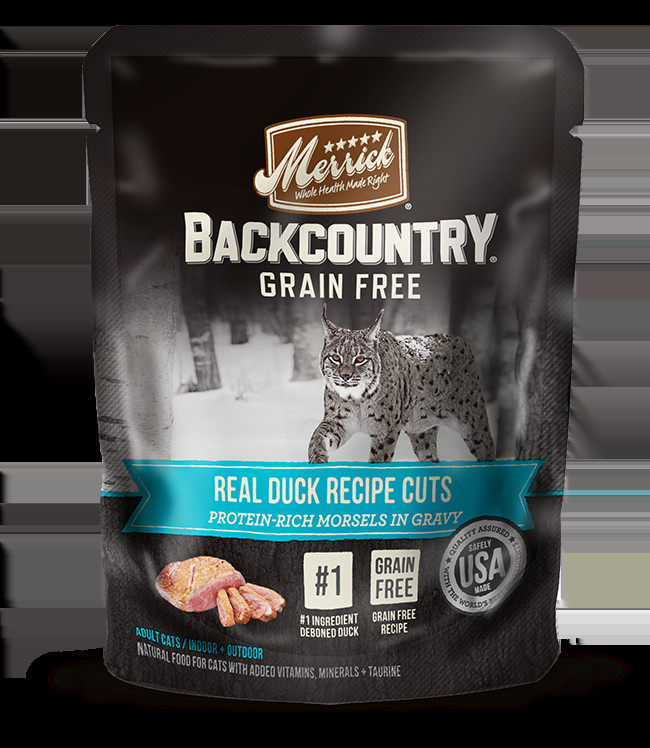 Merrick Backcountry Grain Free Real Duck Recipe Dry Cat Food Pouch
Merrick Backcountry Grain Free Real Duck Recipe Dry Cat Food Pouch
When encouraging a cat to gain weight, especially one with a diminished appetite, taste is paramount. Merrick Backcountry Recipe Cuts excels in both palatability and nutritional value, making it our top overall choice. This formula is designed with calorie-dense, premium ingredients to provide complete and balanced nutrition while enticing even the pickiest eaters. Inspired by an “ancestral diet,” it features protein-rich morsels in a savory gravy that cats find irresistible. The Real Duck recipe, with duck and turkey as primary ingredients, delivers 998 kcal per kilogram, or 85 kcal per 3 oz pouch. Merrick’s website even offers a convenient feeding calculator to help you determine the ideal portion size for your cat’s specific caloric needs.
Highlights:
- Features real deboned duck as the first ingredient, providing high-quality protein.
- Savory morsels in gravy enhance taste and encourage consumption.
- Grain-free formula, excluding wheat, corn, and gluten.
- Available in various flavors and kitten-specific recipes.
- Made in the USA.
Considerations:
- As a premium food, it comes at a higher price point.
Best High Calorie Canned Cat Food: Open Farm Grass-Fed Beef Rustic Blend
Our Pick: Open Farm Grass-Fed Beef Rustic Blend
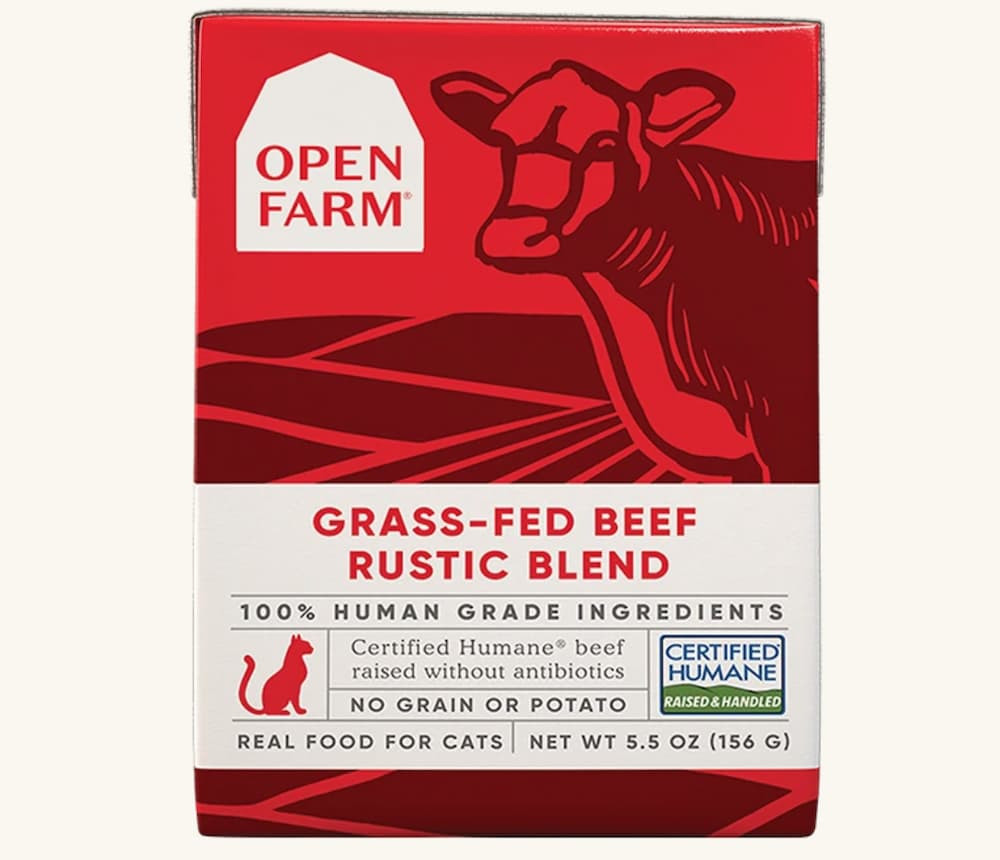 Open Farm Grass-Fed Beef Rustic Blend Wet Cat Food Carton
Open Farm Grass-Fed Beef Rustic Blend Wet Cat Food Carton
For cats who prefer the moist texture of wet food, Open Farm Grass-Fed Beef Rustic Blend is an excellent high-calorie option. Crafted with human-grade ingredients, this recipe features ethically-sourced, grass-fed beef raised without antibiotics, combined with local produce and nutrient-rich superfoods like pumpkin and cranberries. Open Farm Grass-Fed Beef Rustic Blend provides 1,000 kcal per kilogram, or 169 kcal per carton.
Highlights:
- Formulated for optimal feline health and well-being.
- Traceable ingredients, sourced with ethical and sustainable practices.
- Versatile – can be served as a complete wet food meal or as a topper to dry food.
- Available in multiple flavors including chicken, salmon, herring, and mackerel.
- Enriched with superfoods like coconut oil, a source of omega 9 fatty acids and energy.
- Grain-free, filler-free, and by-product-free.
- No artificial flavors, colors, or preservatives.
- Convenient, resealable, and BPA-free packaging.
Considerations:
- Requires refrigeration after opening.
- Check “best by” dates before serving.
Best Subscription Delivery Service for High Calorie Cat Food: Smalls Food for Cats
Our Pick: Smalls Food for Cats
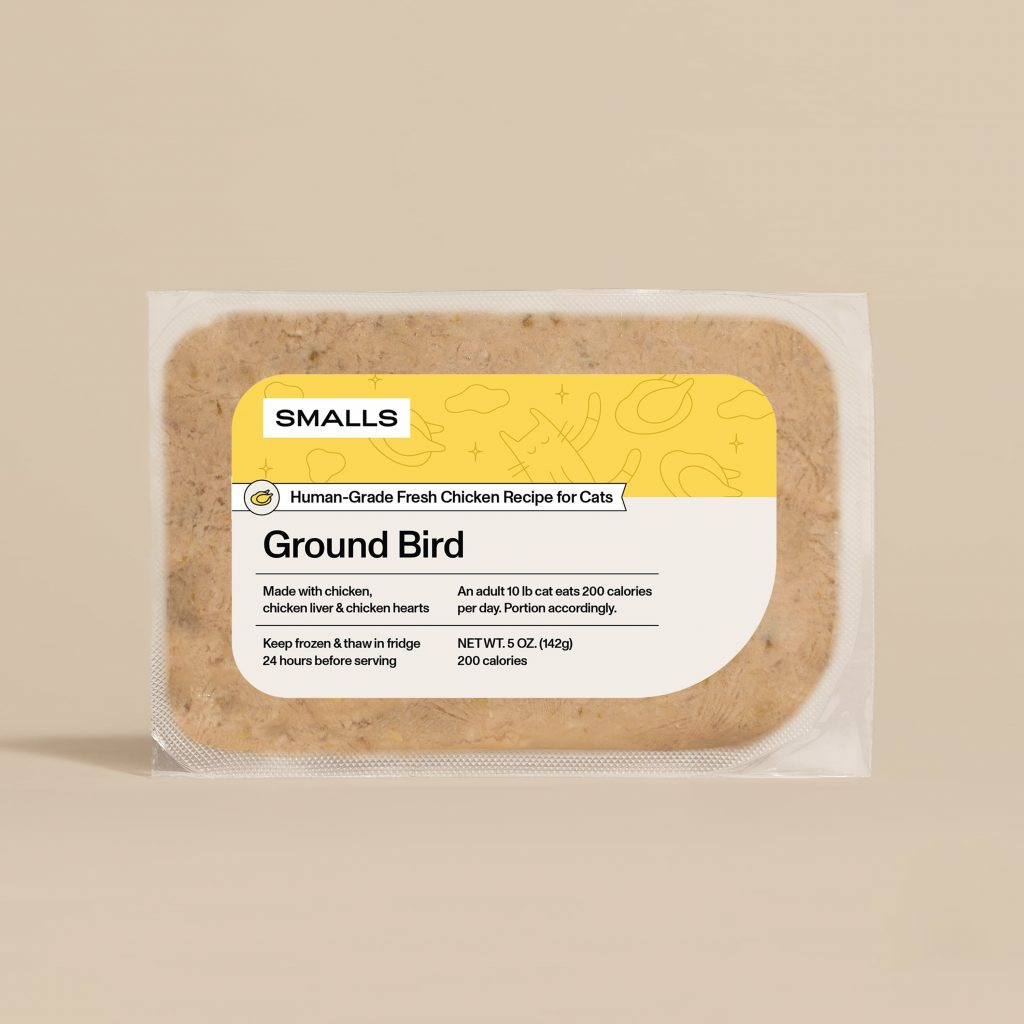 Smalls Ground Bird High-Calorie Cat Food Packet
Smalls Ground Bird High-Calorie Cat Food Packet
Smalls Food for Cats emphasizes human-grade, all-natural ingredients in their recipes, ensuring high quality and palatability. Focusing on high moisture, high-quality animal protein, and low carbohydrates, Smalls offers energy-dense food with approximately 40 calories per ounce and over 31% fat. Smalls recommends around 20 kcal per pound of body weight daily for adult cats, and each packet contains a 200 kcal serving designed for an average 10-pound cat. Their subscription service provides convenient, regular deliveries right to your door.
Highlights:
- 200 calories per package, available in chicken, turkey, beef, and fish flavors.
- Ingredients sourced from the USA and Canada.
- USDA certified human-grade formulas.
- Convenient subscription service ensures you never run out of food.
- Includes added vegetables, mimicking a more natural feline diet.
- Meals arrive frozen.
Considerations:
- Wet food should be stored in a sealed container in the refrigerator for up to 5 days or frozen for up to 12 months.
- Currently no options for cats with kidney disease.
- Kittens under 12 months and pregnant/nursing cats have different caloric needs.
Best High Calorie Dry Food For Senior Cats: Nulo Freestyle Senior Dry Cat Food
Our Pick: Nulo Freestyle Senior Dry Cat Food
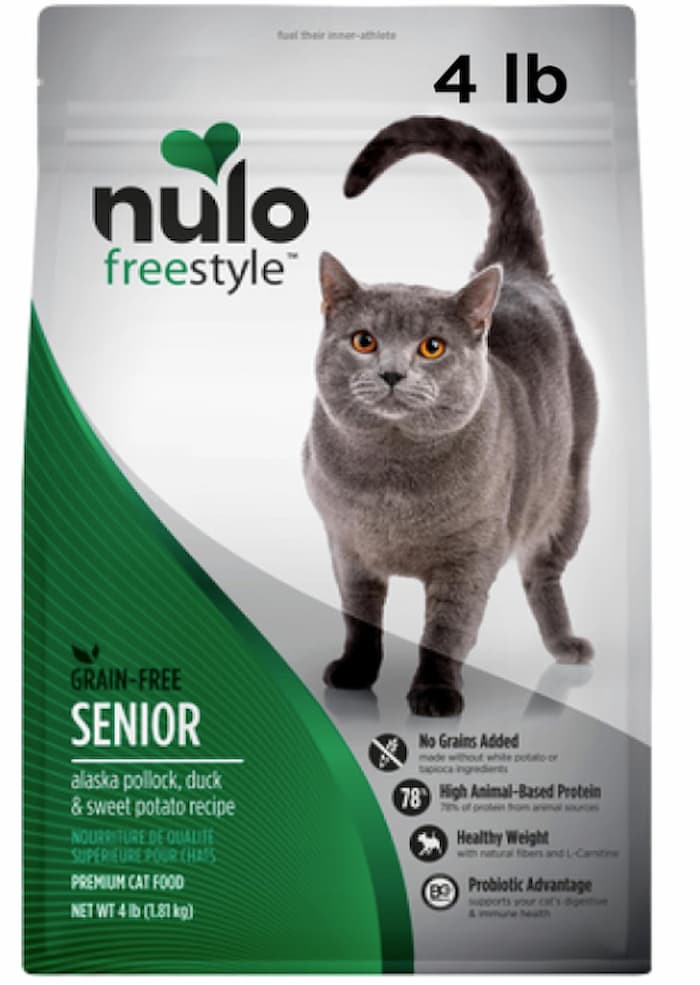 Nulo Freestyle Senior Dry Cat Food Kibble
Nulo Freestyle Senior Dry Cat Food Kibble
Nulo Freestyle Senior Dry Cat Food is specifically formulated for older cats, with 78% of its protein derived from poultry and fish. This grain-free recipe avoids white potatoes and tapioca, and includes a patented human-grade probiotic (BC30) for digestive health. Natural fiber and L-carnitine help senior cats maintain a healthy weight. Each cup contains 431 kcal of animal-based protein and is low in carbohydrates.
Highlights:
- Low glycemic ingredients for stable energy levels in senior cats.
- High animal-based protein content from meat and fish sources.
- Small, disc-shaped kibble is easy for older cats to chew.
- Resealable bag for freshness.
- Made in the USA.
- Fortified with antioxidants and Omega 3 & 6 fatty acids.
Considerations:
- Pricier than some other dry food options.
- Feeding amounts vary based on the senior cat’s weight.
Best High Calorie Cat Food For Senior Cats (Wet): Royal Canin Aging 12+
Our Pick: Royal Canin Aging 12+
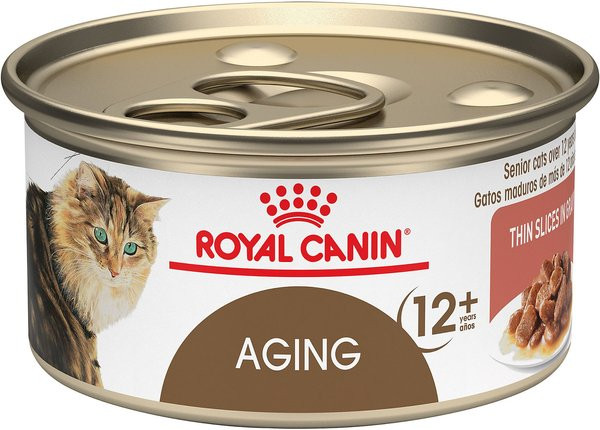 Royal Canin Aging 12+ Loaf In Sauce Canned Cat Food
Royal Canin Aging 12+ Loaf In Sauce Canned Cat Food
Royal Canin Aging 12+ is designed to address the common appetite loss in senior cats (12+ years). This precisely balanced formula provides essential nutrients for healthy aging. The delicious loaf in sauce texture is gentle on sensitive teeth and gums. It’s also enriched with omega-3 fatty acids for joint support and has reduced phosphorus levels for kidney health. Royal Canin Aging 12+ contains 844 kcal per kilogram, or 122 kcal per can.
Highlights:
- Calorie-dense to meet the needs of senior cats with reduced appetites.
- Appealing to picky eaters with an optimal protein, fat, and carbohydrate ratio.
- High levels of essential fatty acids for joint health.
- Non-prescription formula.
Considerations:
- Specifically formulated for older cats, not ideal for multi-cat households with younger cats unless portion control is carefully managed.
- Not grain-free or non-GMO.
Best Prescription High Calorie Cat Food: Hill’s Prescription Diet a/d Urgent Care
Our Pick: Hill’s Prescription Diet a/d Urgent Care
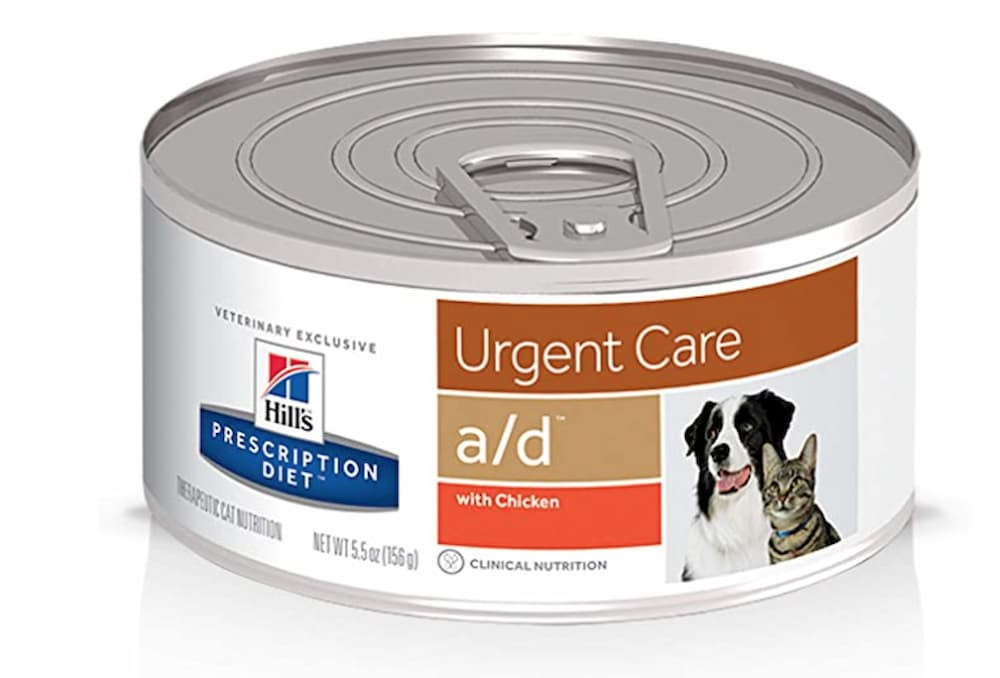 Hill's Prescription Diet a/d Urgent Care Canned Food
Hill's Prescription Diet a/d Urgent Care Canned Food
For cats recovering from surgery, illness, or injury, Hill’s Prescription Diet a/d Urgent Care provides essential support. This high-calorie prescription diet is formulated to bolster natural defenses and promote recovery. The recipe includes turkey liver, pork liver, chicken, and other protein-rich ingredients to stimulate appetite and aid in healing. This diet contains 1180 kcal per kilogram, or 183 kcal per 5.5 oz can.
Highlights:
- Protein-rich and calorie-dense to support wound and tissue healing and boost immunity.
- Soft consistency suitable for bowl feeding, syringe feeding, or feeding tubes.
- Added potassium to help prevent nutrient deficiencies.
- Formulated for both dogs and cats.
Considerations:
- Requires a veterinary prescription.
- Intended for intermittent or supplemental feeding, not long-term use (over 6 months).
- Can be expensive per case.
Best Grain-Free Calorie Dense Cat Food: Wellness CORE Grain-Free Original Formula
Our Pick: Wellness CORE Grain-Free Original Formula
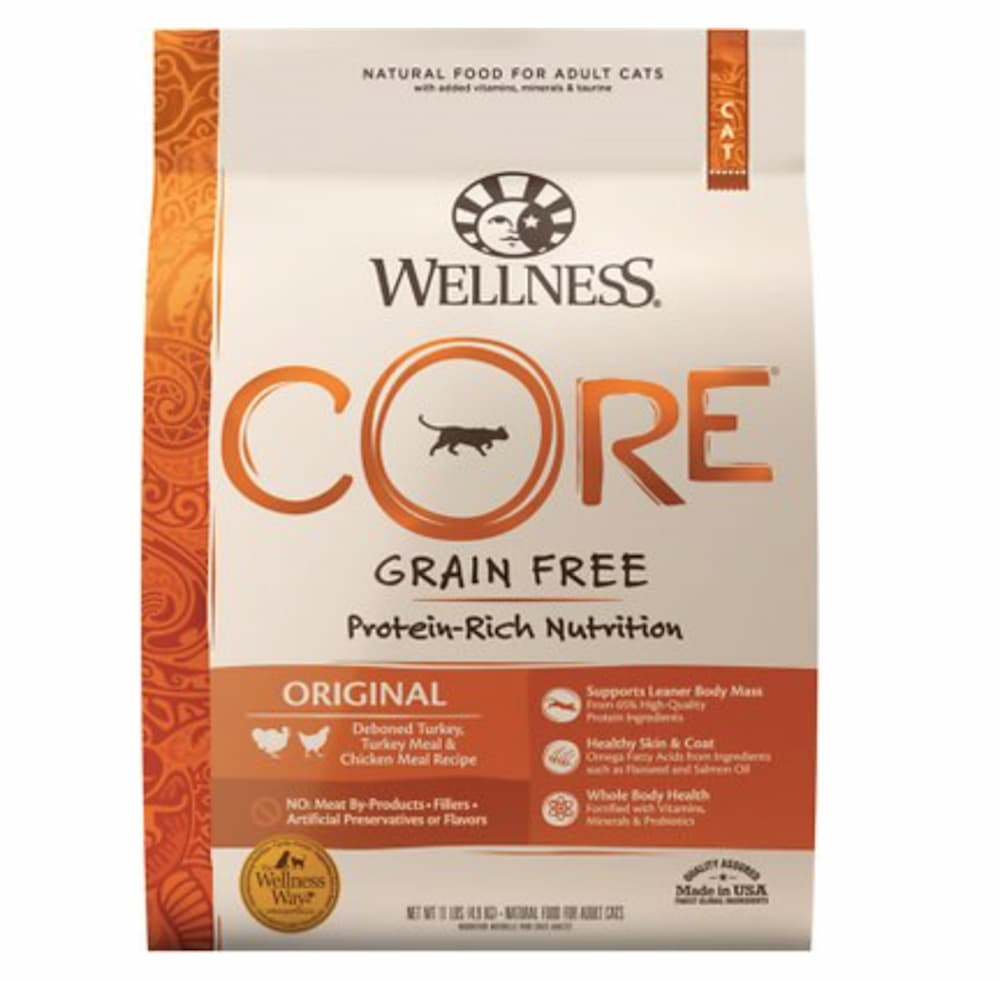 Wellness CORE Grain-Free Original Formula Dry Cat Food Kibble
Wellness CORE Grain-Free Original Formula Dry Cat Food Kibble
Wellness CORE Grain-Free Original Formula prioritizes ingredient quality and calorie density. Deboned turkey and chicken are the top ingredients in this protein-rich, grain-free recipe, providing 65% high-quality protein and added probiotics for digestive health. Flaxseed, salmon oil, and antioxidants support skin health and immunity. This formula contains 3,977 kcal per kilogram, or 497 kcal per cup.
Highlights:
- Grain-free, excluding wheat, gluten, corn, soy, and eggs.
- No artificial colors, flavors, or preservatives.
- Also available in wet food form.
- Available in various bag sizes.
- Made in the USA.
Considerations:
- Considered a premium pet food, reflecting in the price.
- While grain-free, it’s manufactured in a facility that processes grains, which may be a concern for cats with severe grain allergies.
Best High Calorie Kitten Food: Royal Canin Mother and Babycat Ultra-Soft Mousse
Our Pick: Royal Canin Mother and Babycat Ultra-Soft Mousse
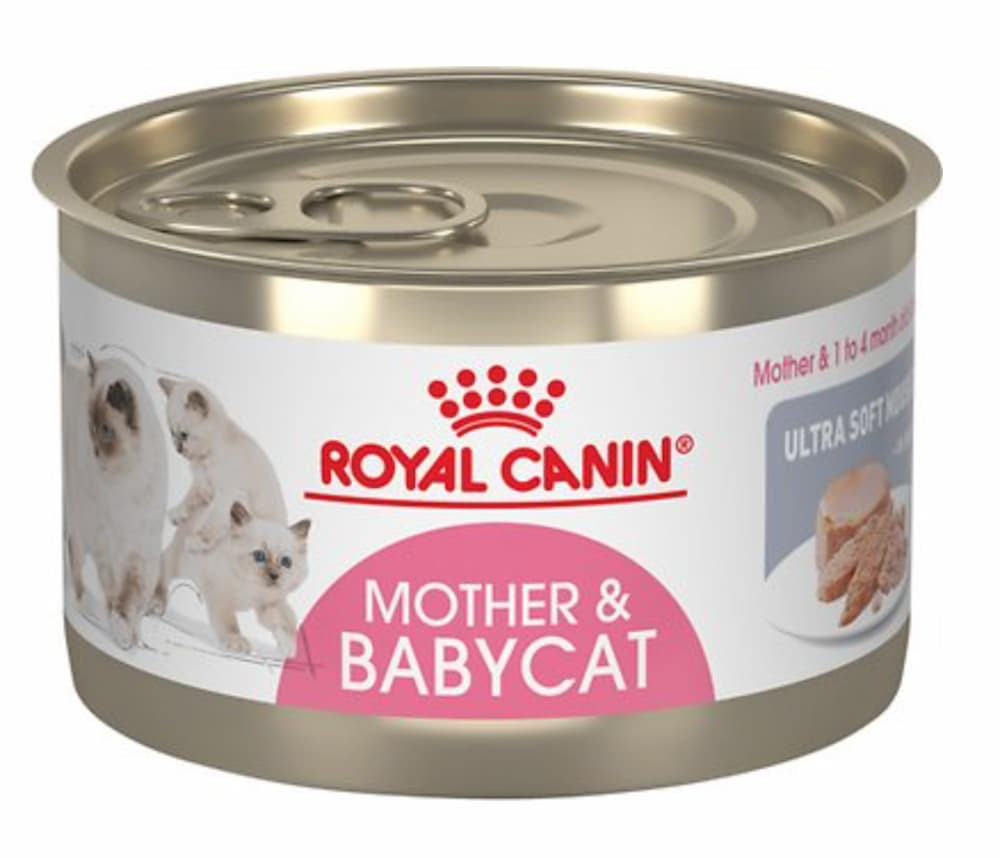 Royal Canin Mother & Babycat Ultra-Soft Mousse Wet Cat Food
Royal Canin Mother & Babycat Ultra-Soft Mousse Wet Cat Food
Royal Canin Mother and Babycat Ultra-Soft Mousse is specifically designed to meet the unique nutritional demands of pregnant or nursing mother cats and kittens (1-4 months). This mousse provides the extra calories needed during gestation and lactation, along with crucial DHA for brain development in kittens. It supports healthy growth, bone development, teeth emergence, and immune and digestive system development as kittens transition to solid food. This diet contains 919 kcal per kilogram, or 78 kcal per can.
Highlights:
- Nutrient-dense formula supports both nursing mothers and growing kittens.
- Soft mousse texture aids kittens transitioning to solid food.
- Contains antioxidants and vitamins to strengthen the immune system.
- Highly digestible proteins and prebiotics for digestive health.
- Also available in a dry food formula.
- Non-prescription formula.
Considerations:
- Not intended for regular, ongoing feeding of adult cats.
- Limited flavor options.
What Exactly is High-Calorie Cat Food?
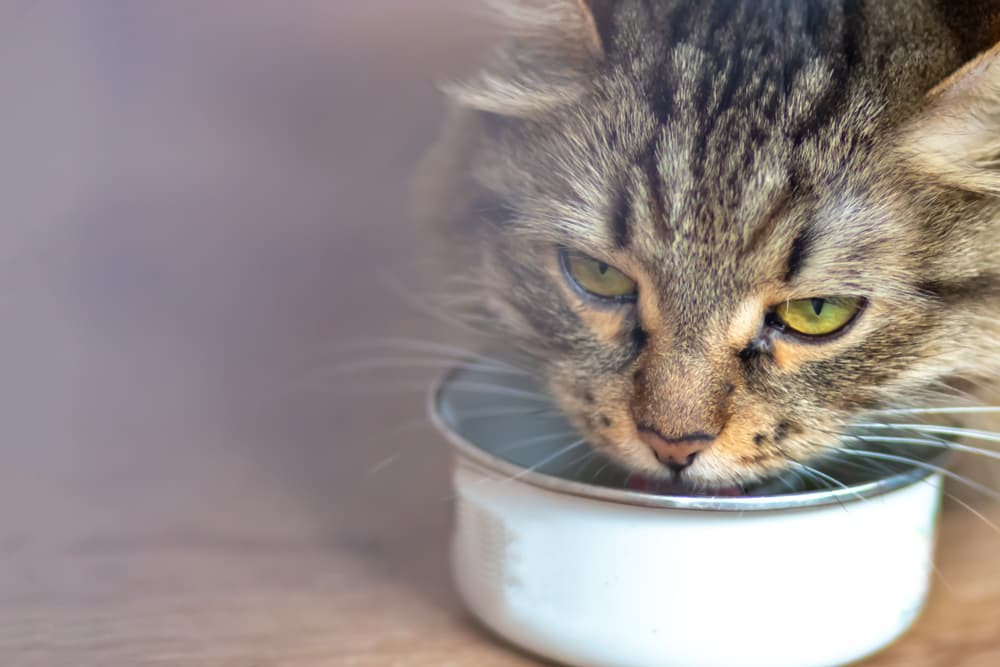 Domestic cat eating high-calorie cat food from a bowl
Domestic cat eating high-calorie cat food from a bowl
High-calorie cat food isn’t about empty calories. As long as it meets the Association of American Feed Control Officials (AAFCO) standards for “complete and balanced” nutrition, it’s a beneficial dietary tool. These foods are formulated with increased protein and fat to boost calorie density while still providing essential nutrients.
Veterinarians often recommend high-calorie cat food for cats needing to gain weight due to illness, senior age, or being underweight. Dr. Garity explains, “Cats can sometimes be selective or picky about what they eat, especially when ill or as they age. High-calorie foods allow them to eat smaller portions and still get enough calories.”
Why Do Cats Need High Calorie Cat Food?
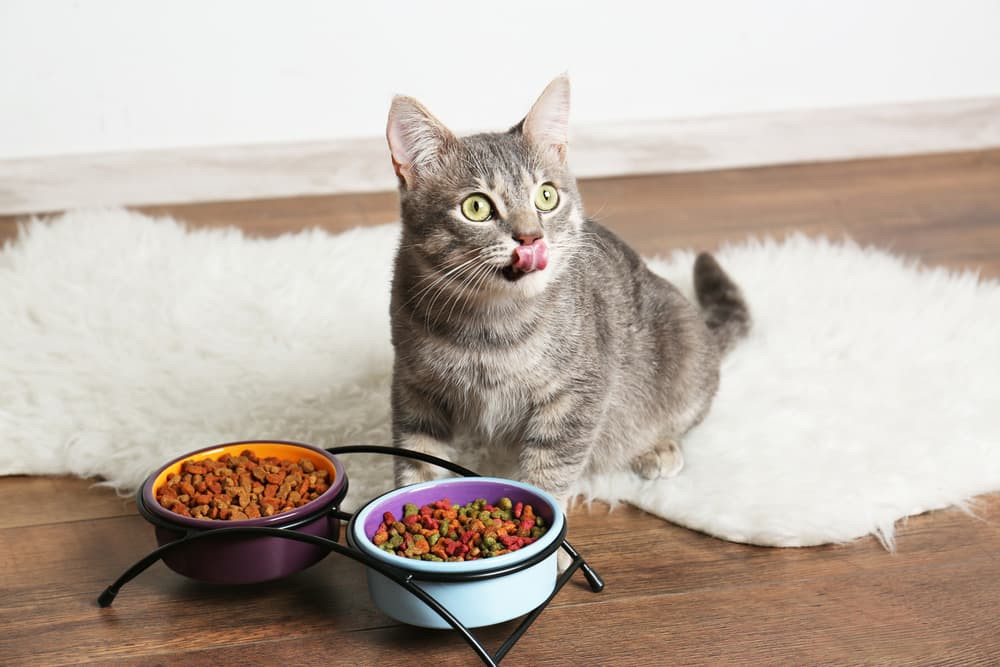 Confused cat looking at high-calorie cat food
Confused cat looking at high-calorie cat food
High-calorie cat food isn’t for every cat. It’s specifically recommended by vets for cats underweight due to various health issues, including chronic pain, dental disease, parasites, lung disease, cancer, or digestive problems. Senior cats, convalescing cats, and “unthrifty” kittens (failing to grow properly) may also benefit. It’s also crucial for malnourished rescued cats and critical patients recovering from trauma or surgery, sometimes requiring feeding tubes.
“We typically use high-calorie foods when cats are dealing with illnesses,” Dr. Garity states. Because these foods are calorie-dense, cats with reduced appetites don’t need to eat as much to meet their daily caloric needs.
Why Is Your Cat Losing Weight?
Weight loss in cats can stem from simple issues like insufficient food intake or food aversion. However, it often signals underlying medical conditions requiring veterinary attention. Common medical causes for weight loss include:
- Intestinal parasites (worms)
- Diabetes
- Feline viral diseases (FIP, FeLV, FIV)
- Kidney disease
- Cancer
High-calorie cat food may be a part of your veterinarian’s treatment plan. For senior cats experiencing weight loss, conditions like feline cancer, hyperthyroidism, and chronic kidney disease are common culprits. Always consult your vet if your cat is losing weight; it’s not always just aging.
Precautions When Feeding High-Calorie Cat Food
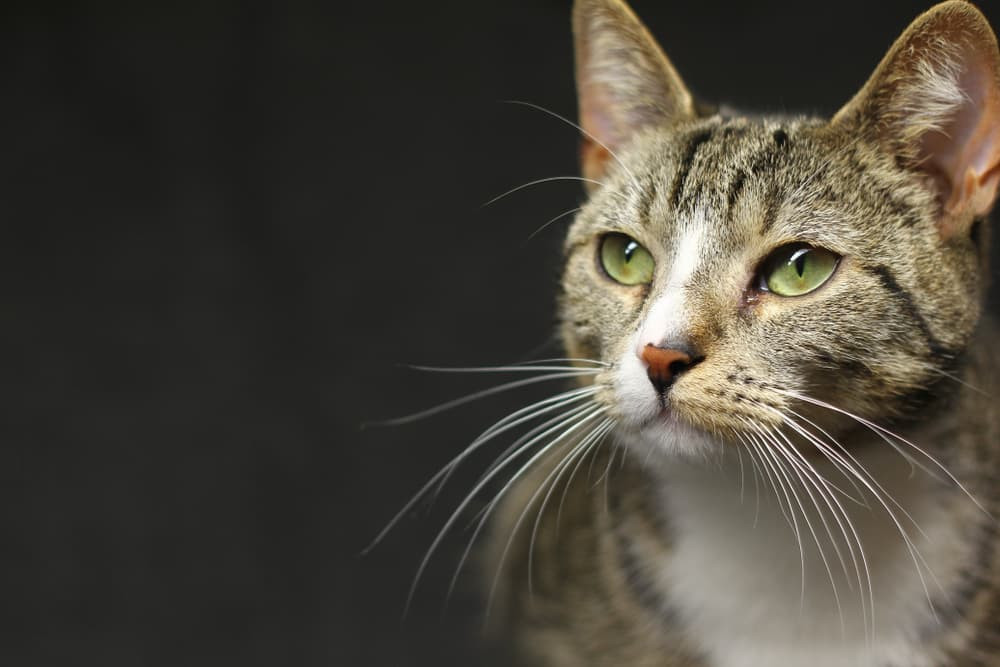 Close-up of a cat looking at the camera
Close-up of a cat looking at the camera
Always consult your veterinarian before switching to a high-calorie diet. “High-calorie foods are often high in protein and fats,” warns Dr. Garity. “This can be contraindicated for cats with conditions like kidney or gastrointestinal disease.”
Portion control and weight monitoring are essential when feeding high-calorie food, as excessive weight gain can cause health problems. It’s often intended as a short-term solution. High-fat cat foods can also be high in calories, so always check labels.
Discuss high-calorie cat treats with your vet as well. While treats are fine in moderation, overindulgence isn’t ideal. The best high-calorie cat food, whether canned, dry, or subscription-based, depends on your cat’s individual needs. Choosing the right food, with veterinary guidance, ensures your cat receives the calorie-dense nutrition needed for healthy growth and recovery.
